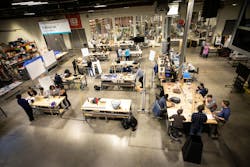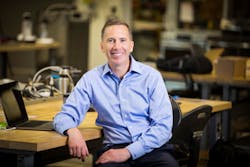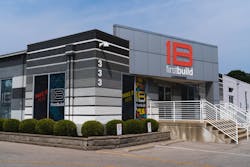Making Swords and Smokers with GE Appliances
Sometimes the best way to promote innovation at your company is to shelter innovators from the company.
Anyone can walk into a GE Appliances FirstBuild facility and play with everything from CNC machines and lathes to soldering stations, 3D printers and lasers, by making a reservation and paying for their materials.
Sometimes innovators come up with small appliances like the Opal nugget ice maker, developed in 2015, or the Mella indoor mushroom fruiting chamber that FirstBuild launched in 2021. FirstBuild also developed the concept for a multimedia range hood called the Kitchen Hub, manufactured by GE Appliances.
Sometimes people use a forge to create swords (true story).
GE Appliances CEO Kevin Nolan says innovation is the key. His innovation-first mindset means that while GE Appliances founded FirstBuild, the company does not own the ideas birthed there. The people who develop innovative technology at FirstBuild could theoretically take their technology elsewhere and design products for GE Appliance’s competitors.
From a corporate point of view, potentially giving away profitable technology might sound more absurd than the prospect of people making swords right next to people designing small household appliances.
But Nolan doesn’t think innovation is about locking down intellectual property. It’s about speed of iteration and time to market. After 34 years in the small appliance industry and decades spent trying to innovate the old-fashioned way, Nolan decided to change the game.
Rethinking Corporate Innovation
General Electric, the former parent company of GE Appliances, has longstanding ties to the state of Connecticut. The company moved its headquarters from New York City to Fairfield in 1974 and decades earlier ran a plant in Bridgeport, Connecticut, that produced small appliances like clothing irons, toasters, coffee makers and mixers.
Nolan also has long-standing ties to Connecticut. He graduated with an engineering degree from the University of Connecticut in 1989 and soon after took a job at GE, setting up new lighting, industrial and appliance products and assembly lines, outsourcing with OEMs and bringing the products in.
In 2006, Nolan ascended to vice president of technology at GE Appliances. Innovation moved quickly in the fast-paced appliance business but also no differently than for GE’s jet engine, train or light bulb divisions.
“We had your typical what I call ‘funnel process’ for innovation where you take a bunch of ideas and you keep down-selecting them. You work them, and then when they’re ready, we bring them out to market. It’s a very traditional way to drive innovation,” Nolan says.
In 2008, GE announced plans to sell its appliances division, hoping to earn up to $8 billion on the sale. The financial crisis that year put an end to the plans, but from that point forward GE Appliances felt more like a standalone company, says Nolan.
Around this time, GE Appliances looked into reshoring, owing to the time delays and expense of offshore manufacturing. This inspired the company to think about modernizing its plants and rethinking its innovation practices.
“With outsourcing manufacturing, you do start losing your ability to innovate because manufacturing and innovation, they need to be tied together. They need to run in synchrony with each other,” says Nolan.
Traditionally, he says, companies consider innovation budgets as a percentage of revenue. In tough times, innovation budgets often disappear first. Just when they need to innovate, they cut innovation off at the knees. Nolan knew GE Appliances had to break that paradigm to achieve success.
In 2013, GE launched a program called FastWorks, based on Eric Ries's “lean startup” methodology. GE engineers prototyped products, shared them with customers to gather feedback and then iterated the prototype based on that feedback.
FirstBuild drew on some of those concepts but cut closer to the heart of the problem. If innovation and manufacturing must run in sync, why not link open co-creation with on-site microfactories to bring the new ideas into reality? So, in mid-2014, GE Appliances founded FirstBuild in Louisville.
FirstBuild had barely gotten off the ground when a major change happened: In 2016, GE sold GE Appliances to Chinese manufacturer and current owner Haier. By that time, GE Appliances produced only major appliances, having backed out of the small appliance space as early as 1984.
In 2020, GE Appliances (Haier kept the division brand name) officially made its return to small appliance manufacturing by launching a broad line of products including coffee makers, toaster ovens and food processors.
But the company had technically returned to the small appliance space years earlier, via the FirstBuild project. FirstBuild's microfactory originally produced the Opal nugget ice maker, but when it couldn’t keep up with orders, GE Appliances took over manufacturing and added it to the company's product catalog.
Crowdsourcing and Crowdfunding Small Appliance Technology
FirstBuild in Louisville encourages artists and makers, anyone with interest, to come in and use the center’s equipment. Pitches for new products are posted on the FirstBuild website, YouTube and other social media channels for the community to discuss.
Crowdfunding provides the seed money for any project the community agrees to manufacture, as it did with the Opal before GE Appliances took over that project. Customer interest, not corporate market surveys, drives FirstBuild’s agenda.
“We don’t look at the financial payback on anything we work on [at FirstBuild]. We just look at the passion behind the project,” Nolan says.
Take, for example, the Arden indoor smoker. It turns out a lot of people love smoking their food but either don’t have the space for an outdoor smoker or aren’t allowed to have one. What about smoking food indoors (without filling an apartment with hickory smoke, hopefully)? Consumers told FirstBuild it was a great idea and then backed the project on Indiegogo.
Nolan acknowledges that the crowdfunding model confuses a lot of people. After all, GE Appliances certainly has capital to throw at the project and could wind up manufacturing the Arden one day if demand takes off like it did with the Opal.
“You can do all the market surveys you want, but they really don’t mean anything. It’s different when you give me your credit card. The only thing we believe at FirstBuild is if you really like it, you’re willing to pay for it. And that’s why we got into crowdfunding, as a good way to really get good customer validation,” Nolan says.
Defending Innovation from the Suits
Nolan says he provides the program “air cover.” From whom?
“From us.”
It’s part of the reason the original FirstBuild made its home at the University of Louisville, the massive nearby Appliance Park campus, and why the second FirstBuild facility opens its doors in mid-2023 within the larger Co-Create Stamford facility.
When executives see FirstBuild, Nolan says, they worry about someone using GE Appliance’s maker space to develop technology the company has no inherent claim to. Why, say these executives, should their company establish a development space that creates technology its competitors may get their hands on?
That’s not what concerns Nolan. He worries about getting to market fast.
“If you look at the IP process, how long does it take, from the time you have an idea to have a patent? Three years, maybe? So how long does a product really stay relevant in the market? The IP process has not kept up with the speed of market change, especially in areas like appliances,” says Nolan.
Speed of knowledge acquisition is the “real IP” developed at FirstBuild. As an open community, FirstBuild can enhance its projects and turn around new devices in its microfactory much faster than in any corporate environment. Nolan hopes to bring 12 products to market a year, one of which becomes a success and outgrows FirstBuild, like the Opal ice maker. The plan requires fast innovation and iteration, and that requires freedom from corporate hoops and approvals.
Funding the Experiment
All of this freedom carries financial ramifications. Even though it's a non-profit, FirstBuild must run like a business and break even. Makers pay a slight markup on raw materials like wood and metal to generate funds for equipment maintenance, so FirstBuild has a financial motivation to attract as many people to the space as possible.
Nolan doesn’t expect a challenge in attracting makers to FirstBuild Stamford. With two massive Ford plants, GE Appliances, a Siemens plant and dozens of automotive suppliers, Louisville has a large enough manufacturing footprint to make equipment access relatively easy for a maker that wants to build something, but FirstBuild still attracts plenty of talent. It isn’t just about access to equipment. It’s about having fun with other makers.
Stamford, on the other hand, doesn’t offer nearly the same manufacturing footprint. Nolan thinks the draw of free access to advanced equipment should bring in a very enthusiastic maker community. They might come up with the next great appliance. They might just make swords [Editor’s note: Nolan was clear that, ren faire enthusiasts at FirstBuild aside, GE Appliances does not plan on going into the sword-making business]. Whatever the result, Nolan stands convinced that FirstBuild demonstrates the correct direction in which innovation has to move.
“I think if corporate leaders really looked at their innovation track record, and analyzed it and were humble, they’d realize it’s not working that well and they need to do something different,” Nolan says. “What most people are doing is illogical, spending millions of dollars for something that never sees the light of day and never gets into the market. That’s insanity. What FirstBuild is doing is very logical.”
Original FirstBuild facility: Louisville, Kentucky
Located at the University of Louisville’s Belknap campus. Founded mid-2014. Minted success with the Opal nugget ice maker design.
New FirstBuild facility: Stamford, Connecticut
A smaller facility located within the larger Co-Create Stamford facility, built in partnership with the University of Connecticut and Connecticut State Colleges & Universities.
Opening its doors in mid-2023. Will leverage Co-Create’s microfactory that manufacturers the Monogram Smart Flush Hearth oven.
About the Author
Dennis Scimeca
Dennis Scimeca is a veteran technology journalist with particular experience in vision system technology, machine learning/artificial intelligence, and augmented/mixed/virtual reality (XR), with bylines in consumer, developer, and B2B outlets.
At IndustryWeek, he covers the competitive advantages gained by manufacturers that deploy proven technologies. If you would like to share your story with IndustryWeek, please contact Dennis at [email protected].



